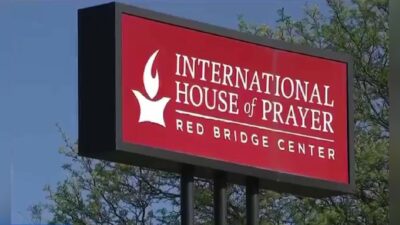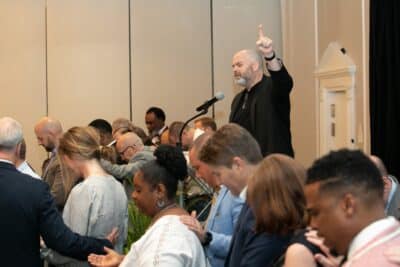As a Christian journalist and broadcaster, I have wrestled with what the Scriptures say about publicly confronting Christian leaders and organizations. Does Matthew 18 apply, and if so, how? Recently, I came across this article by Mark Ballenger and thought it was so good, I asked him for permission to repost, which he graciously granted. Enjoy! — Julie
By Mark Ballenger
Whenever there is an offense between Christians or a Christian leader is being disciplined, Matthew 18:15-20 is usually mentioned a lot. This is good, but it can also be misleading when this passage of Scripture is misapplied. In this article we will review what Matthew 18:15-20 actually says and then discuss three ways this Bible passage about forgiveness is often misused.
What Does Matthew 18:15-20 Actually Say?
One of the most common mistakes we make as Christians is to think we know a passage so well we do not need to actually read it anymore. However, over the months and years our human minds can start filling in the blanks and thus we can think we know what the Bible says when really we don’t. Therefore let’s read Matthew 18:15-20 one more time before discussing how this passage is often misused and abused:
15 If your brother sins against you, go and tell him his fault, between you and him alone. If he listens to you, you have gained your brother.16 But if he does not listen, take one or two others along with you, that every charge may be established by the evidence of two or three witnesses. 17 If he refuses to listen to them, tell it to the church. And if he refuses to listen even to the church, let him be to you as a Gentile and a tax collector. 18 Truly, I say to you, whatever you bind on earth shall be bound in heaven, and whatever you loose on earth shall be loosed in heaven. 19 Again I say to you, if two of you agree on earth about anything they ask, it will be done for them by my Father in heaven. 20 For where two or three are gathered in my name, there am I among them.”
1. Matthew 18:15-20 Applies to a Sin Between Two Individual Christians
The most common abuse I see with Matthew 18:15-20 occurs by totally missing the context that this passage is addressing. This is not a Bible passage that should be applied to correcting every sin for every Christian. These instructions by Jesus on how to bring correction and forgiveness are directed specifically to Christian individuals, “If your brother sins against you, go and tell him his fault, between you and him alone” (Matthew 18:15).
This is so important because often times people feel Matthew 18:15-20 should always be used to correct any Christian living in sin even if their sin was not directly against you. But again, this three step plan of going to the individual, bringing two or three witnesses, and then bringing it to the church is a plan specifically given to someone who has been sinned directly against, “If your brother sins against you . . . .”
Your tax-deductible gift helps our journalists report the truth and hold Christian leaders and organizations accountable. Give a gift of $30 or more to The Roys Report this month, and you will receive a copy of “Hurt and Healed by the Church” by Ryan George. To donate, click here.
Therefore if you see a Christian living in sin but their sin is not against you, this method in Matthew 18:15-20 isn’t a command you must follow. You wouldn’t be doing anything wrong if you followed this plan. It’s obviously a very wise plan regardless of who the sin was against. But if you wanted to confront the person about their sin that wasn’t against you with the help of two or three other people right from the start, you would not be wrong.
This point of clarification is especially important when it comes to correcting Christian leaders in the church. Many times when a pastor’s sin is exposed, people ask right away, “Well did you follow Matthew 18 when you corrected him?” This is biblically naïve and misinformed. In many ways it would be inappropriate for someone to correct their authority figure if that sin was not directly against them. Most times if a Christian leader is living in sin but that sin is not against you, the appropriate step is not Matthew 18:15-20. The proper step is to tell the elders of the church directly to let them handle the situation since they are the authority over the pastor. 1 Timothy 5:19-20 states:
Do not admit a charge against an elder except on the evidence of two or three witnesses. 20 As for those who persist in sin, rebuke them in the presence of all, so that the rest may stand in fear.”
This verse does not say that an elder shouldn’t listen to an accusation against a pastor until the accuser talked to the pastor directly. The proper authority figures should gather the accusations from others and then handle the situation appropriately. Does Matthew 18:15-20 and 1 Timothy 5:19-20 contradict? No because they are addressing two different types of sin occurring in two different types of relationships. Matthew 18:15-20 is to individuals. 1 Timothy 5:19-20 is about correcting the sin in a Christian leader when that sin is not directly against you.
2. If Matthew 18:15-20 Is Not Followed, This Does Not Make the Sinner Any Less Guilty
The above section is so important because bad pastors and false prophets often use people’s lack of knowledge about Matthew 18:15-20 to garnish pity and power to avoid the consequences of their sins. When their sin is exposed, they take the attention off of their failures and try to get everyone to focus on how Matthew 18:15-20 was not followed (even though it did not need to be followed anyways). The congregation feels sympathy for the pastor they love and hold onto the fact that Matthew 18:15-20 was not followed.
This is wrong for multiple reasons. Again, Matthew 18:15-20 does not need to be followed when exposing the sin of a Christian leader. If they were stealing resources from the church, misusing authority, or involved in an affair, there is no need to talk to that pastor one on one. You should go right to the elders because they have been entrusted with the authority to rebuke the pastor on behalf of the whole church.
Secondly, even in cases where Matthew 18:15-20 should have been followed, the fact that it was not followed does not lesson the sin of the offender at all. A sign someone does not really want to repent is when they point to Matthew 18:15-20 not being followed and then expect to be treated more leniently for their sins.
While Matthew 18:15-20 should obviously be followed when the proper context calls for this, even if it is not followed this does not change the reality of a real sin having been committed that needs to be repented of and forgiven. If Matthew 18:15-20 was not followed, that is a separate issue that should be dealt with separately. It should not be used to take the attention off of the offense that really did occur.
3. In Matthew 18:15-20, God Commands Full Forgiveness, Not Full Relationship Rights Again
The third most common misuse and abuse of Matthew 18:15-20 is when people think that after this process of forgiveness is followed, the offender should be given full relationship rights again with the person who was offended.
Nowhere in Matthew 18:15-20 does Jesus deny the reality of relationships. While forgiveness is commanded, God does not expect Christians to forget that damage was done and act the same before the offense occurred. When possible this should happen. But it is impossible to think that a wound can be instantly healed all the time. Forgiveness can be given in a moment, but sometimes it just takes time for the heart the relationship to heal. For example, if a husband and wife go through Matthew 18:15-20 after an affair occurred and forgiveness happens, the adulterer should not be punished for his or her sin. But that does not mean the one who was cheated on must act as though the affair never happened.
He or she has every right to ask extra questions if that person is going on a business trip similar to the trip where the affair took place. The person who was sinned against is not required to instantly no longer be sad or hurt. If the person who did the offending complains about the relationship still being different even though they asked for forgiveness, they are misunderstanding biblical forgiveness and Matthew 18:15-20.
Forgiveness is freeing someone of the punishment they deserve for their sins. Relationships, however, are built on trust and actions. A relationship will never be restored without forgiveness, but to have true restoration more things are often needed too.
For more on this topic of forgiveness and church discipline you may want to read What Does the Bible Say About Forgiveness and Reconciliation? or Lay Aside the Weight of Unforgiveness or Bible Verses on Church Discipline.

Mark Ballenger is the founder of ApplyGodsWord.com, an online ministry created to equip people to apply God’s truth to every aspect of life. Mark has a master’s degree in pastoral counseling from Liberty Baptist Theological University, and has served as a missionary, pastor, and pastoral counselor. He lives in Cleveland, Ohio, with his wife and two children.


















8 Responses
It is so important that we not confuse popular interpretations of scripture with scripture itself and this is so often done particularly with difficult passages.
35 years ago I left a church where the pastor fell into grievous sin. It was so bad, that you could approach any church leader in this small town and they knew. Later, when I asked a denominational leader in the area why something hadn’t been done, his first question was if I had gone through the process of Matt 18 with the pastor. I was so nonplussed I never said what I was actually thinking-that I would not be alone in the presence of someone who preyed on young women. The pastor went on with this behavior in two more places until one church finally had enough.
I think people pull out Matt 18 to avoid situations they do not want to confront.
After reading Mark’s article, I believe that he, as we fallen people tend to do, is guilty of “filling in the/some blanks”, in his assessment of the supposed misuse or correct use of Matthew 18: 15-20, and compounding the assessment by also using Paul’s words to Timothy.
I am not sure if Jesus is pleased that Mark says that Jesus’ instructions in Matthew 18: 15-20, are “… obviously very wise…..”, but whatever. As I bring that up, I am reminded, by The Holy Spirit within me, that in my confronting Mark on that- am I doing so in love, or just being judgemental for the sake of my being right? Ouch- yes, part of me is about that, my justifying myself being that I pursue, point out, and call out others for Christ’s sake- but HE knows my heart, and has just pointed out my error as I wrote out my pointing out Mark’s (in my opinion) “error”.
In my reading of Matthew 18: 15-20, and trying to not associate it to the MBI issue just now, I disagree with Mark saying that Jesus is talking about correction and forgiveness. I do not “see” that connection anywhere in those verses. The compounding of the “distracting” then comes when Mark adds Paul’s words to Timothy, more or less- filling in the blank part, about correction and forgiveness- instructing Timothy how to handle a situation.
Whenever we have any seed of confusion or doubt, in seeking God’s Will, through HIS Word, I believe it is clear that we should always go to Jesus Himself, in prayer, especially when the scriptures we are referencing were not said or written by Jesus Himself. Too many people “worship” Paul, in my opinion, when they should seriously consider Paul’s writings, and test the spirit, as he says, and always, without fail- defer to Jesus, ask Jesus in prayer, if what Paul has written, applies, and if so, how.
Having said all that, and thankful for the opportunity to study, reexamine Matthew 18:15-20, and how it “applies” in the MBI situation, I offer this:
Jesus tells us that if our brother sins against us- and who is our brother, if we are part of the family/church? Is it not, could it not be even an unbeliever whom Jesus is moving in HIS direction, through us? I believe that is an attitude we are called to have and act on. Just love one another HE said, right? HE did not say, “if they” this or that…. and in loving our brother/sister, known or unknown, to us, we will “naturally” point out their faults, for their sake, not ours.
I believe that the basic message in Matthew 18: 15-20, is that Jesus is telling us to love one another, truly, by telling them that we know they sinned- and if they listen, to us, to The Holy Spirit, then they will respond rightly.
If they don’t, then we love them with the help of others, who are acting in true love, telling the offender, that they know also, and again, trusting the offender’s response to The Holy Spirit.
And finally, we are to love the offender by exposing them to the church….. and I don’t see or “see” Jesus referring to any deacons, elders, or other “authorities”, rather, I believe that Jesus is pointing out, that if we sin against our brother or sister, and we don’t acknowledge, confess, and repent of our sin- in response to our brother or sister pointing it out in love- then more and more people will know of the original sin, and those people may not be as loving, or merciful, in their response to our sin.
Matthew 18: 15-20, is simply Jesus expounding on HIS telling us to love one another. If we follow HIS Instructions there, knowing that HE knows our heart, and our effort- that is “all” we need do. The pressure is on “the brother” then- not us.
From what I have read as Julie has informed everyone- those pursuing the truth as well as those who may be trying to deny and hide it- she has “followed” Jesus’ instructions with HIS Love and to the best of her ability. Those whose behaviors have been called out and not listened….. will answer to Jesus Himself. As we know they appear to not have acknowledged their sin, after our following Jesus’ instructions, we simply pray for them until they respond to The Holy Spirit convicting them, or until The Holy Spirit tells us to stop praying for them.
God has it, and all the people there, teachers and students alike. HE is working out great things through the personal relationships HE has with those involved, as well as those involved who think they know better than HIM. Unless a seed dies…..
I think when Jesus mentions Mat 18, it is not an absolute for Christians. Why are you people so focused on the words. Words are dead but the spirit is alive. The occasion is not as a universal truth to be applied in all cases. Julie, you are right, this cannot be applied to you in this case. But you might get a letter from the institution, if you keep this up. Their lawyers are thinking about you a lot.
good article. I think the most important statement is
“bad pastors and false prophets often use people’s lack of knowledge about Matthew 18:15-20 to garnish pity and power to avoid the consequences of their sins” Bad leaders also use this as an excuse to ignore troubling information about another leader that is brought to their attention. 1 Timothy 5 seems even more problematic in the way it is abused than Matthew 18. Pastors who commit sexual abuse are able to silence their victim and other church leaders are able to turn a blind eye, because they do not have another witness to back up their accusation. Does 1 Timothy 5 exclude even people who were directly sinned against by a pastor from bringing a charge against that pastor if nobody else witnessed it? I don’t think so. I don’t think that is meant for situations in which a person was a direct victim of the pastor’s sin. This article may help clarify such a situation in situations like that because Matthew 18 seems to give a person a right to bring any matter before the entire church in which they are a victim. It seems more likely that 1 Timothy 5 allows for additional accountability for elders/pastors rather than less.
Certainly it is good to have a respectful attitude toward leaders (nitpicking about every little thing is not helpful) but leaders are not gods and I am grateful for people willing to question things that need to be questioned. The fact that somebody is hastily fired without explanation for expressing concerns simply amplifies those concerns.
The word “brother” is an double entendre. It can mean a blood-relative, or another male. Mark is presuming the Lord is referencing a blood relative only. How do we know for sure? Simple: review the times the Lord used the word “brother” in reference to other males (all).
In regards to forgiveness, I would recommend an excellent book entitled, “Unpacking Forgiveness” by Chris Brauns. It gives a great Biblical approach as to what it means to forgive as God forgives.